Key takeaways:
- Antivirus software detects, prevents, and removes malware using techniques like signature-based detection and heuristic analysis.
- It provides peace of mind by protecting sensitive information and keeping devices safe from evolving cyber threats.
- Key features include real-time scanning, scheduled scanning, and firewall protection, enhancing overall online safety.
- Choosing antivirus software should involve consideration of usability, provider reputation, and additional security features beyond baseline protection.
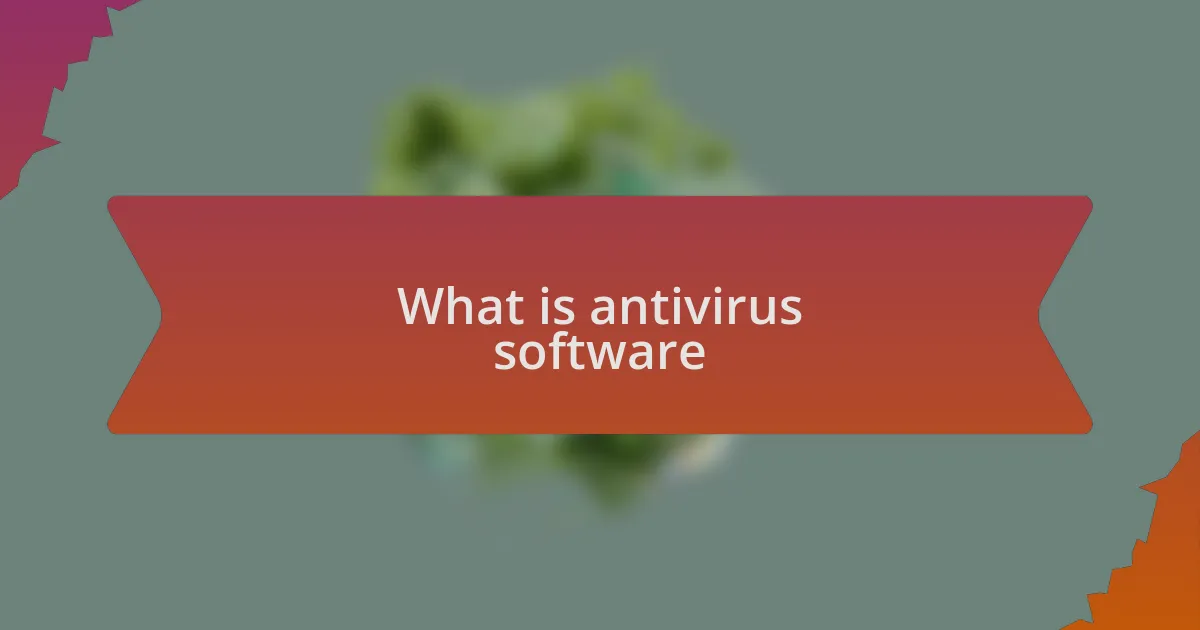
What is antivirus software
Antivirus software is a type of program designed to detect, prevent, and remove malicious software, commonly known as malware. I remember the first time I installed an antivirus on my computer; it felt like putting on a protective shield. That sense of security is invaluable, especially when you’re navigating the vast and often risky landscape of the internet.
These programs work by scanning your files and programs for known threats, but they also use heuristics to identify unfamiliar malware by analyzing behaviors. It’s fascinating how technology has evolved to recognize not just the threats we know but also those we haven’t encountered yet. Have you ever wondered how often you unknowingly come across potential risks while browsing? I often reflect on the times I felt uneasy clicking on a link, and it’s reassuring to know that the software is diligently working behind the scenes.
Moreover, antivirus software often includes additional features like firewalls and phishing protection, enhancing your overall online safety. I sometimes find myself amazed at how a single installation can transform my digital experience. It reminds me that, just like we lock our doors at night, protecting our devices against cyber threats is essential to maintaining peace of mind in today’s digital world.
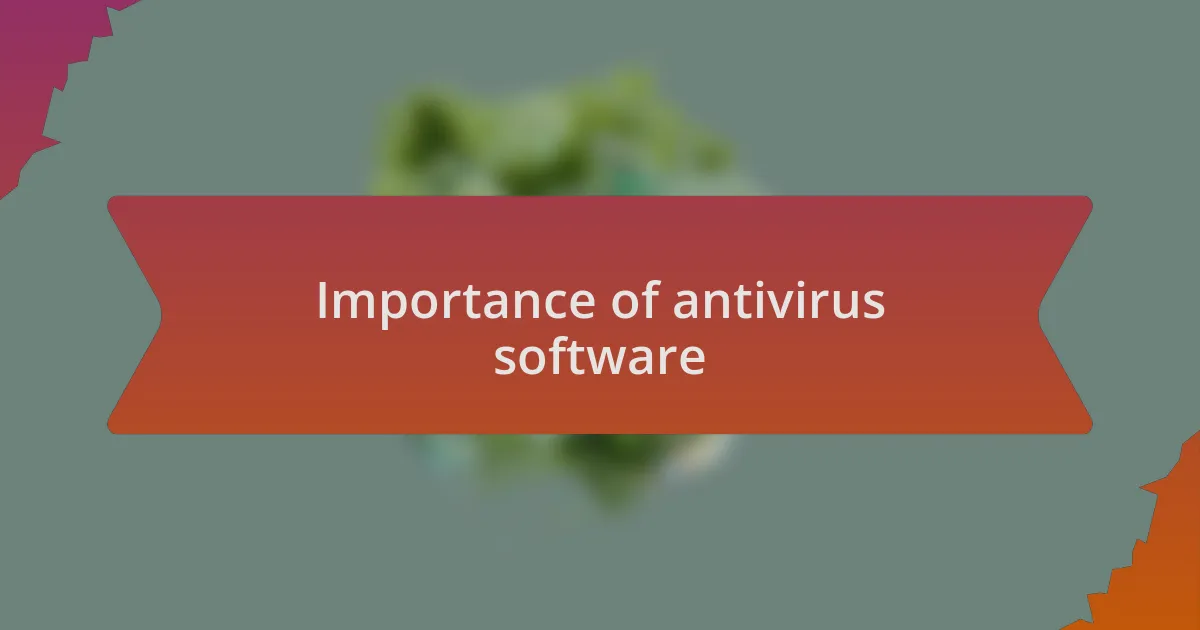
Importance of antivirus software
Antivirus software serves as the frontline defense against the relentless tide of cyber threats. I recall when a friend of mine fell victim to a ransomware attack; it was alarming to see how quickly his files were held hostage. This incident reinforced for me just how critical it is to have reliable antivirus protection installed. Without it, our devices are left vulnerable, and the risks we take online can lead to dire consequences.
One aspect that often gets overlooked is the peace of mind antivirus software provides. I remember the anxiety of sharing sensitive information online before I had a solid antivirus solution. Knowing that my data is safeguarded against potential breaches allows me to focus on more important things, like streaming my favorite shows without interruption or communicating with family without paranoia. It brings to light the question: why gamble with your digital safety when protection is just a download away?
In an age where cyber threats constantly evolve, keeping antivirus software updated is equally important. I’ve felt a profound sense of relief after installing updates that often include new virus definitions, effectively staying one step ahead of attackers. It’s like doing regular maintenance on your car; neglecting it could eventually lead to a breakdown. How often do we truly consider the security of our devices? For me, it’s a no-brainer; investing in antivirus software isn’t just about defense—it’s about peace of mind in an unpredictable digital arena.
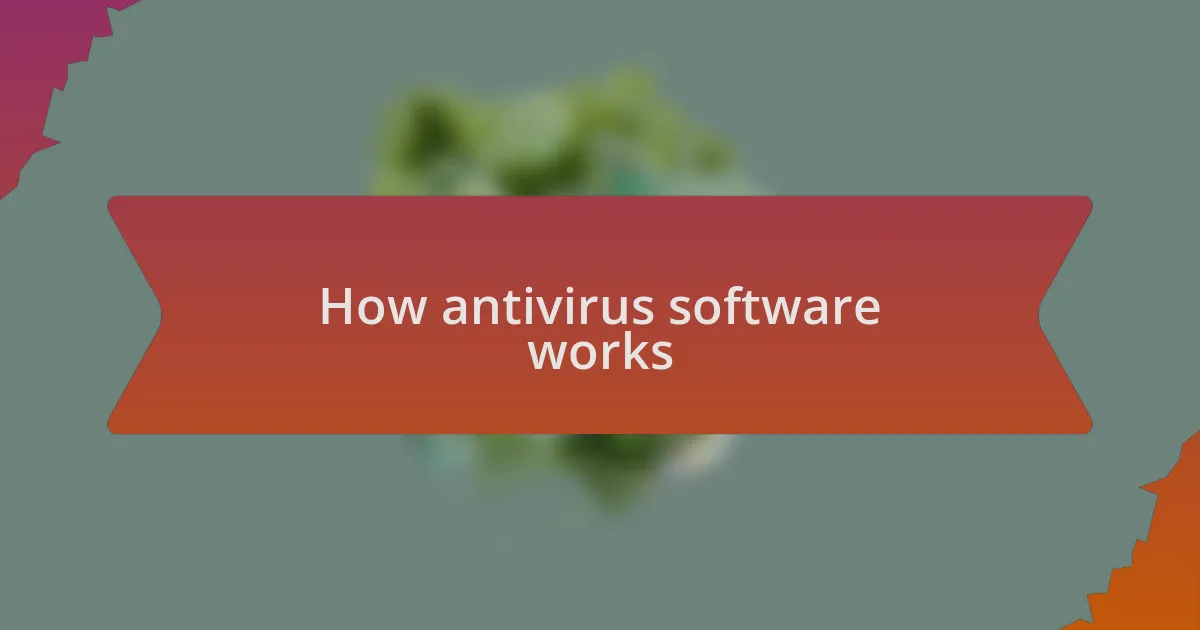
How antivirus software works
Antivirus software operates using a combination of techniques to detect and eliminate threats. It primarily relies on signature-based detection, which means it identifies known malware by comparing files against a database of signatures. I remember when I first learned about this process; it felt like a digital detective scouring files for fingerprints of malicious activity. This step is crucial, but, in truth, it’s just the beginning of how antivirus programs keep our devices safe.
Another fascinating aspect is heuristic analysis, which allows antivirus software to identify potential threats even if they aren’t in its database yet. This process analyzes the behavior of files and programs, flagging anything that appears suspicious. Think of it like a seasoned librarian noticing that a book is out of place; the software raises a red flag before something harmful can wreak havoc. Whenever I see my antivirus software running these analyses, it reminds me of how vigilant technology can be, often protecting me before I even know there’s a danger lurking.
Cloud-based detection is another layer that enhances how antivirus software functions. By leveraging updated threat intelligence from users worldwide, it can respond to new threats much faster than relying on local databases alone. I still remember a close call where my antivirus software identified a suspicious file just moments after I downloaded it, thanks to this cloud capability. Does it ever amaze you how technology evolves to keep pace with emerging threats? For me, it’s a constant reminder of the importance of staying informed and prepared in our digital lives.
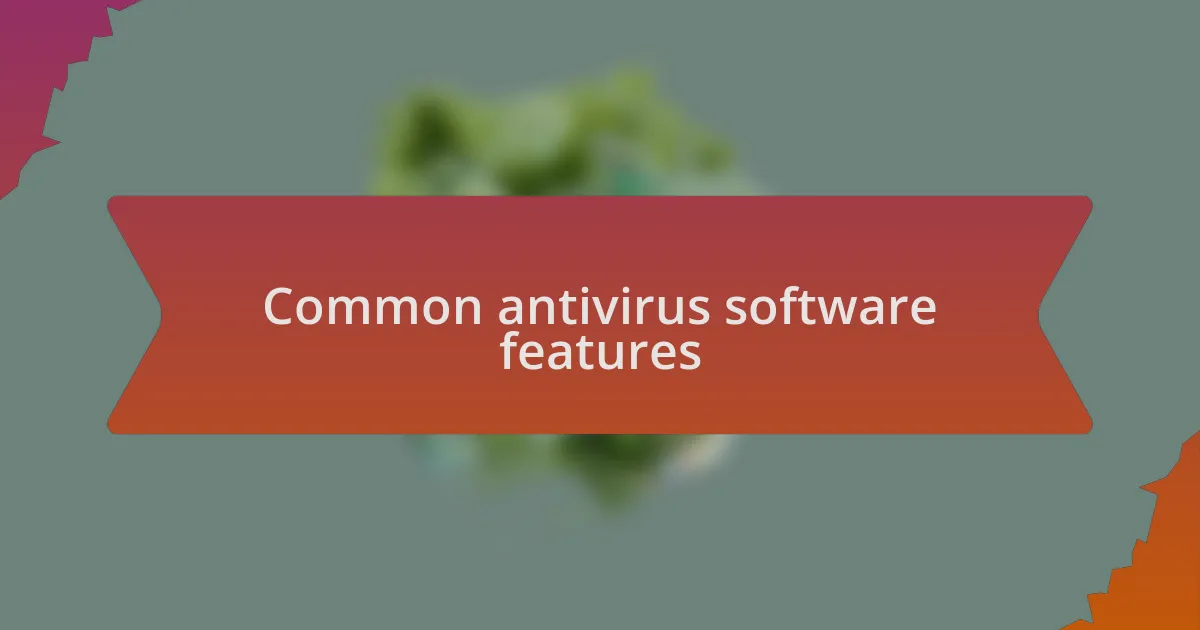
Common antivirus software features
One of the most common features you’ll find in antivirus software is real-time scanning. This feature scans files and applications as they are opened or downloaded, which is essential for immediate threat detection. I recall a moment when I clicked on a seemingly harmless link, and my antivirus immediately flagged it as dangerous. It felt like a digital guardian stepping in just when I needed it, highlighting how vital this protective layer can be.
Another key feature is scheduled scanning, which allows users to set specific times for the software to systematically check for malware. Personally, I prefer to schedule scans during times when I’m not using my computer—like overnight. This not only keeps my system clean but also gives me peace of mind knowing that every corner of my device is being inspected while I sleep. Don’t you think that such capabilities contribute significantly to the overall effectiveness of antivirus solutions?
Additionally, many antivirus programs offer a firewall feature that monitors and controls incoming and outgoing network traffic. This can be particularly important for protecting sensitive information while using public Wi-Fi. I remember traveling and relying on hotel Wi-Fi; having that extra layer of security felt reassuring. Isn’t it comforting to know that features like these are working behind the scenes, safeguarding our data as we navigate the digital world?
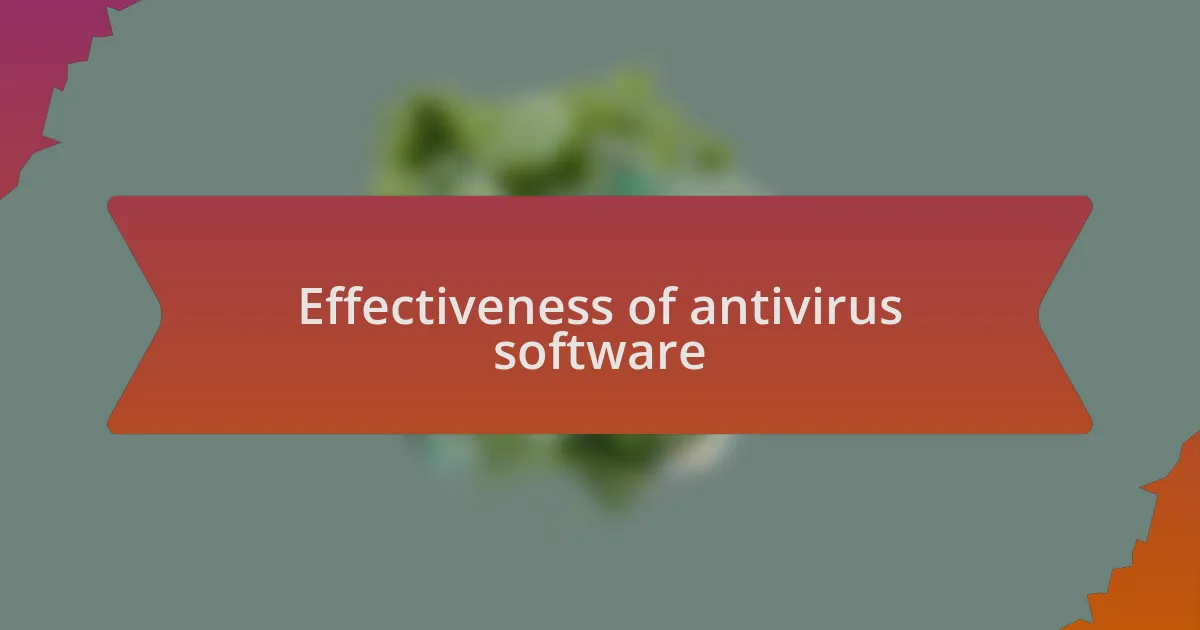
Effectiveness of antivirus software
Consider how effective antivirus software can be in responding to evolving threats. I remember a time when a new strain of malware was circulating, and my antivirus software promptly pushed an update. It wasn’t just about catching threats; it was about being prepared for the unknown. Have you ever felt that your antivirus was a step ahead, almost anticipating what danger might come next?
Another factor in effectiveness is the software’s ability to handle different types of malware, including ransomware and spyware. I had a close call with a ransomware attack that locked me out of my files. Thankfully, my antivirus had the capability to restore my system to a previous state without losing crucial data. This experience underlined how essential it is to choose an antivirus that offers comprehensive protection against various threats. Isn’t it freeing to know you have that kind of reliability in your corner?
Finally, I think user education plays a significant role in the effectiveness of antivirus solutions. An instance stands out when I read about social engineering tactics that trick users into downloading malware. My immediate reaction was to enhance my awareness of online risks, understanding that no software can replace the vigilance we need as users. Wouldn’t you agree that a tech-savvy user combined with solid antivirus software creates a formidable defense?
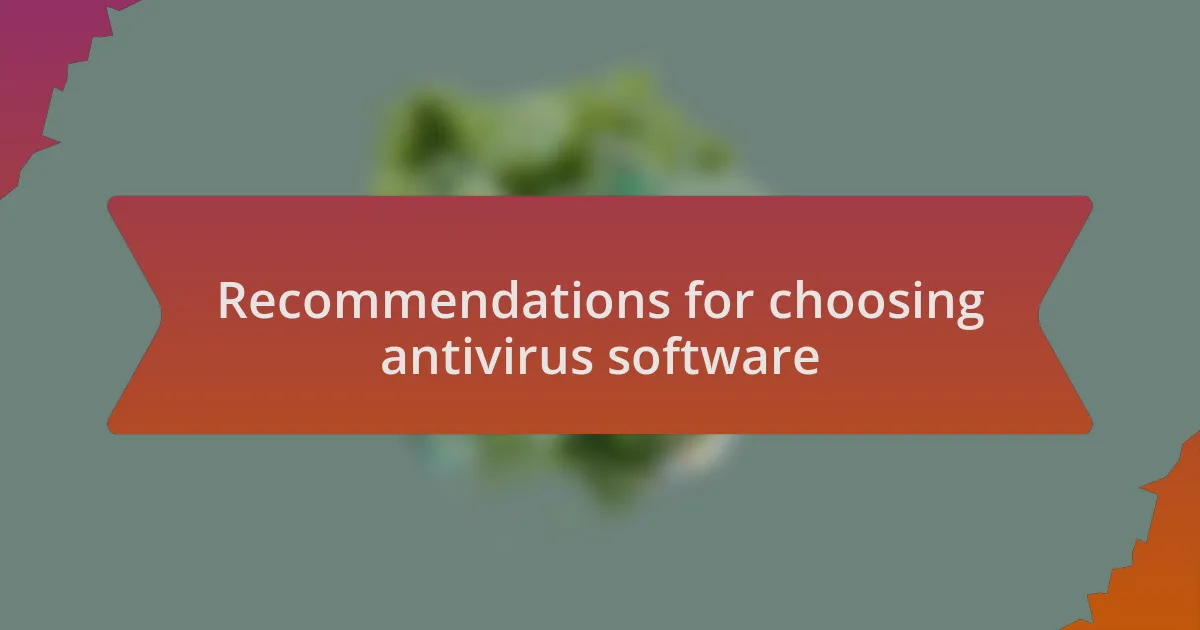
Recommendations for choosing antivirus software
When choosing antivirus software, I highly recommend looking for options that offer a user-friendly interface. I remember the frustration of struggling with a complicated setup during my first experience with antivirus software. A straightforward installation process not only saved me time but also gave me confidence that I was protected without a steep learning curve. Have you ever hesitated to use a feature because the interface seemed intimidating?
It’s also crucial to consider the provider’s reputation and commitment to timely updates. In my experience, I once selected a lesser-known antivirus, thinking it would be fine, but frequent updates were a rarity. It left me anxious as I watched new threats arise without my software keeping pace. Isn’t it unsettling to think about the potential risks when your software isn’t actively combating emerging malware?
Lastly, think about the additional features that go beyond basic protection. I recently discovered a program that included a built-in VPN and password manager, which not only enhanced my security but also simplified my online experience. This all-in-one solution made me realize how valuable it is to have multifaceted protection. Can you imagine the peace of mind that comes from knowing your online activities are secured on multiple fronts?